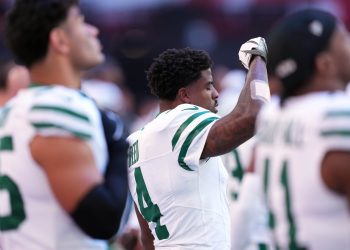Reviving the San Francisco Giants’ Lagging Farm System
Former star catcher Buster Posey faces a daunting challenge in revitalizing the San Francisco Giants’ struggling farm system, plagued by a series of early-round draft disappointments that have left it in a precarious state.
A New Era Unfolds with Buster Posey at the Helm
With Buster Posey assuming the role of president of baseball operations, the Giants entered a new chapter this offseason. Posey wasted no time in making a significant impact by securing a groundbreaking seven-year, $182 million deal with free-agent shortstop Willy Adames, the largest contract in franchise history. This move significantly bolsters the team’s lineup and sets the stage for a promising future.
The Giants’ infield now boasts Adames and third baseman Matt Chapman, forming a formidable left side. Tyler Fitzgerald’s shift to second base and the anticipated contribution of Bryce Eldridge as the future first baseman further solidify the team’s infield prowess.
Challenges in the Farm System
Despite the positive strides in the Major League lineup, Posey faces a major hurdle in rejuvenating the Giants’ farm system. The organization currently grapples with a lack of top-tier young talent in the minor leagues. Apart from Eldridge, few prospects exhibit substantial potential, primarily due to the extensive promotion of prospects to the Major League level in recent years.
Moreover, the Giants’ struggle to identify and nurture talent in the early rounds of the draft has exacerbated the situation. Notable first-round disappointments like Joey Bart, Hunter Bishop, Will Bednar, and Reggie Crawford have hampered the system’s growth, as highlighted by Keith Law in his farm system power rankings for The Athletic.
While players such as Fitzgerald, Patrick Bailey, and Birdsong offer a glimmer of hope for recent drafts’ success, the overall trend of failed early-round selections poses a significant obstacle to rebuilding the farm system’s strength.
Implications of Weak Farm System
The repercussions of the Giants’ farm system deficiencies extend beyond the minor leagues, impacting the team’s competitiveness at the Major League level and hindering trade negotiations for established talent. A dearth of MLB-ready prospects not only weakens the Giants’ roster but also diminishes their bargaining power when engaging in player transactions with other teams.
Keith Law’s ranking of the Giants’ farm system at No. 26 underscores the urgency of addressing these challenges to prevent further decline. While potential breakthroughs among international signings offer a glimmer of hope for improvement, the imminent promotion of Eldridge threatens to exacerbate the system’s vulnerability, given his pivotal role in bolstering the Giants’ current value.
In conclusion, Buster Posey faces an uphill battle in reviving the San Francisco Giants’ farm system, characterized by a lack of high-impact prospects and a history of draft failures. Overcoming these obstacles is crucial not only for the team’s long-term success but also for sustaining its competitiveness in the dynamic landscape of Major League Baseball.









